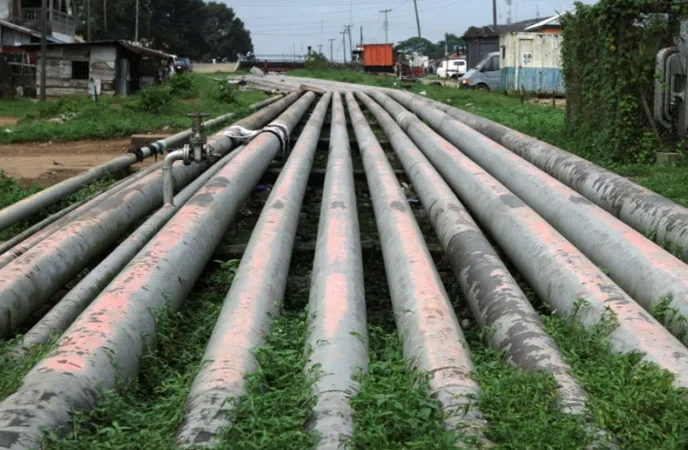Massive Oil Theft, High Pipeline Repairs Cost, Bleeding Nigeria’s Economy

- At 200,000bpd, over $29bn lost to theft in six years
- Over N700bn expended on repairs, maintenance
A combination of huge oil pipeline repairs cost and a high-level crude oil theft are bleeding the Nigerian economy, with losses amounting to at least $29 billion in the last six years, spanning 2015 to 2021.
In February last year, the Nigerian National Petroleum Company (NNPC) Limited disclosed that the country lost an average of 200,000 barrels per day of its crude oil production to saboteurs and illegal pilfering by criminals. At the time, the national oil company’s Group Managing Director, Mallam Mele Kyari, had said, “We have two sets of losses, one coming from our products and the other coming from crude oil. In terms of crude losses, it is still going on. On average, we are losing 200,000 bpd.” Kyari said this in Abuja during a meeting with Chief of Defence Staff (CDS), General Lucky Irabor, to discuss collaborative efforts to curb the menace.
The amount, as revealed by Kyari, excluded NNPC’s intermittent contracts for the rehabilitation of its downstream facilities, ranging from critical pipelines to depots and terminals, and the Build, Operate and Transfer (BOT) financing model, of which 96 companies from various jurisdictions indicated interest in 2021.
At the daily loss of 200, 000 barrels, it would be about 73 million barrels in a year and about 438 million barrels in six years under the current administration, to give roughly $29 billion when calculated over the period.
A Flavision analysis showed that at a projected 1.86 million barrels per day in 2021, the country recorded nearly 200 million barrels’ crude deficit, out of a possible 700 million barrels yearly, in the first 11 months of the year.
Moreover, statista.com, which tracks oil prices from 1960 till date, put the average price of oil per barrel in 2015 at $49.49, $40.76 in 2016, $52.51 in 2017, $69.78 in 2018, $64.04 in 2019, $41.47 in 2020, and $69.3 in 2021.
Using a median oil price of $64.5 for the six years multiplied by the 446.4 million barrels lost within the period, Nigeria lost approximately $29 billion in the last six years.
In 2021 alone, Nigeria was estimated to have lost as much as $4 billion, about 10 per cent of the country’s foreign reserves, to oil theft, and also suffered a double jeopardy of spending its scarce resources on the maintenance of the incessantly breached oil assets.
In the last couple of months, due to its inability to ramp up production, despite growing international oil price, NNPC was only able to contribute N14 billion, N10.5 billion, and N20 billion, respectively, to the federation account, although it projected N209 billion monthly.
Nigeria’s oil and gas industry had continued to haemorrhage, with the country losing as much as 6.596 million barrels in the December 2021 production circle. At an average of $75 per barrel for last month and a conservative official rate of N415/$1, Nigeria failed to take advantage of high international oil prices for the month, losing a whopping $487.5 million or roughly N202.3 billion.
The figures from NNPC indicated that the losses were due to a combination of factors, including force majeure declared by a Joint Venture (JV) partner. Other reasons listed by the national oil company included community issues, maintenance work, sabotage, and technical matters, like leakages, pressure build-up, and faulty valves.
Lamenting the huge hole the activities of oil thieves was digging in his company’s revenue, Chairman of Heirs Holdings, Tony Elumelu, a few days ago said the company, Heirs Oil and Gas, was losing as much as 50,000 barrels of crude oil to criminals daily. Speaking last week, during a lecture he delivered to members of Course 30 of the National Defence College on the theme, “Strategic Leadership: My Business Experience,” Elumelu described the situation as a national disgrace.
He stated,
We produce sometimes about 87,000 barrels per day, thieves take 50,000 per day and, to me, this requires a national seminar or dialogue.
In my view, it is one of the highest levels of threat to our country because it’s so much money in the hands of people who don’t pay tax, people we don’t regulate, the country is not safe. They do that to us; they do that to other operators also.
Elumelu added,
We look forward to men and women in this room who will help remove this national disgrace and problems that we face.
In December, according to a Flavision analysis, some of the assets, which took the greatest hits, included Bonny, which haemorrhaged to the tune of 2.712 million barrels for the month due to the force majeure declared on the Nembe Creek Trunk Line (NCTL).
The Urha terminal followed with 1.468 million barrel losses, which curtailed production within the period, thereby hobbling exports. For context, the loss from that particular terminal exceeded the country’s production for the entire month.
Odudu terminal also suffered the same fate due to decrease in production as a result of maintenance work on the Odudu and Ima terminal.
Furthermore, Forcados shed 456,575 barrels of oil as a result of what NNPC described as community issues delaying reinstatement of the facility.
Besides, Yoho dropped 420,000 barrels during the month owing to a faulty valve, Ajapa lost 30,000 barrels due to shutdown, while Aje terminal curtailed production within the period to the tune of 62,000 barrels.
Brass was not spared as it suffered sabotage around Tebidada and Ogbaibiri flow stations as well as the valve issues, pressure build-up, high sand production, and leak repairs, resulting in a total loss of roughly 198,200 barrels.
Last week, the Nigerian Upstream Petroleum Regulatory Commission (NUPRC) lamented that with the Organisation of Petroleum Exporting Countries (OPEC) production quota of 1.683 million bpd in January and 1.701 million bpd in February, Nigeria was only able to pump 1.396 million bpd currently. NUPRC stated that this was leading to a loss of at least 115,926 million bpd, put at roughly $300 million monthly.
We are losing about 115, 926 barrels per day, so that literally translates to roughly about $300 million and that’s a huge loss to a nation that actually requires these funds,
the commission’s Chief Executive, Mr. Gbenga Komolafe, stated.
Komolafe attributed the underperformance to mostly oil theft, sabotage, vandalism, as well as technical issues, including ruptures associated with the assets.
But the larger percentage is due to crude oil theft and as a commission we know the impact of this and recognising our regulatory role, we have been able to reach out to other operators as to what we can do about this,
he added.
A former Executive Secretary of the Nigerian Extractive Industries Transparency Initiative (NEITI), Waziri Adio, speaking on the matter recently, stressed that since Nigeria first reported oil losses, the situation had escalated and was taking its toll on the country.
In a period of 10 years, he stated, an analysis by NEITI put losses to oil theft at $41.9 billion, about $4.1 billion per year. He said aside its economic implications the losses also had security ramifications.
Adio said,
This is something that causes a lot of risks, not just financially but also security wise. There are implications for the environment; there are implications for the Niger Delta, for health and safety.
Most of the measures that have been put in place are not enough. They are inadequate and actually the problem is getting worse at a time when the country is in a very hard place.
He added,
We have never had it this bad. Something really is going on. The enforcement of the law is very weak, the surveillance mechanism is weak, the security apparatus is also not clearly focused.
What we are doing in terms of technology, we are just scratching the surface. The problem is not new. It’s always been there, but it’s getting worse and it’s getting worse because we have not done enough to solve the problem.
But aside the huge losses to oil theft, there’s also the cost of repairing the lines when they are breached.
Last year, the federal government said, through its spokesman, Mr. Lai Mohammed, that the government was spending N60 billion to repair and maintain vandalised oil and gas pipelines annually.
The minister, who spoke in July 2021 at a town hall meeting on protecting oil and gas infrastructure in Abuja, said between January 2019 and September 2020, 1,161 pipeline points across the country were vandalised.
With an average of 200,000 barrels per day lost to the wanton damage to pipelines and a huge amount of N60 billion yearly to repair and maintain the vandalised points, one can only imagine the impact on the economy,
Mohammed stated.
However, THISDAY checks revealed that this figure might be lower than what obtained in reality.
Data independently obtained from NNPC indicated that between January and December 2015, N103.4 billion was spent on pipeline repairs and management. From January to August 2015 alone, over 1,824 cases of breaks were reported on the pipelines.
In all, the government appears helpless, despite attempts in the past to reduce the incidence of vandalism and oil theft.
Before the Buhari administration, the preceding government had devised a strategy of hiring community members as guards, mostly hiring warlords from the areas who in turn hired those to be deployed at the facilities.
In 2011, reports said the federal government signed pipeline protection contracts worth at least $39.5 million a year with local guards. But NNPC’s own data indicated that losses actually went up after the new contracts commenced.
But when Buhari took over, he frowned on the arrangement, put a halt to it, and literally described it as an insult to the Nigerian Armed Forces. He believed it insulted the security services that gang leaders were trusted to secure the country’s assets, despite the existence of the armed forces.
Neither Buhari’s strategy, nor those of the presidents before him has worked.
The situation worsened in 2016, when the federal government spent N112 billion attempting to fix the problem, rising about N9 billion from the previous year.
In that year, N14 billion was incurred in February, N14.8 billion in July, and N14.9 billion in August. The lowest amount of N880 million was spent in January before aggrieved Niger Delta militants virtually brought the industry to its knees.
At least 2,560 vandalised points were recorded between January and December of that year. A check further showed that in 2017, N129.87 billion was spent on the phenomenon, while N137.44 billion was expended in 2018. But in 2019, the cost was reported as N127 billion.
However, in 2020, the cost of repairs reduced considerably to N60.5 billion, and further fell to 29.5 billion in 2021, the least spending in years. The fall in the cost of repairs may not be unconnected with the fact that many of the pipes have now been abandoned.
While oil theft is not a new phenomenon, with countries like Ghana, Morocco, Uganda, Mozambique, Mexico, Thailand, Azerbaijan, and Turkey experiencing different levels of theft, the volumes from Nigeria remain incredibly high.
For instance, while the stealing of oil across the global industry averaged 70,000 bpd of crude output in August 2020, Nigeria experienced significantly higher losses, with theft estimated at 200,000 barrels per day.
However, it is believed that access to oil pipelines in Nigeria is markedly easier due to alleged connivance of top security operatives, ageing infrastructure, community acquiescence, as well as a complex web of complicity by contractors and oil companies’ staff who gain when the pipelines are breached.
While it is difficult to establish what happens on the high seas, where vessels allegedly load crude oil without requisite papers under the watchful eyes of the security operatives, those in the know insist that the high volume of the commodity moved out of the Niger Delta illegally would not be possible without connivance from top security agents.
Leader of the Reformed Niger Delta Avengers (RNDA) and a coalition of nine other militant groups in the Niger Delta, self-styled Johnmark Ezon-Ebi, in a chat with Flavision earlier had alleged that high-ranking officials of government and security agencies were the major illegal oil ‘bunkerers’, who stole crude oil from Niger Delta and sold overseas through proxies.
An activist and National President of Ijaw Peoples Development Initiative (IPDI), Austin Ozobo, corroborated the claim and gave an insight into how the different categories of oil thieves in the region operated and settled security agents on the waterways.
A legal practitioner and former President of Ijaw Youth Council (IYC), Eric Omare, said the connivance of security agents was well known. He added that his concerns were the effect of oil bunkering on the environment and the fact that due to joblessness, graduates had joined the oil bunkering business.
In the same vein, Governor Nyesom Wike of Rivers State had also accused a serving General Officer Commanding (GOC) 6 Division of the Nigerian Army of promoting oil theft in the Niger Delta.
In November last year, Wike again doubled down on the matter, alleging that the fight to stop oil theft had continued to fail because top-ranking military officers were involved.
Since this year, Wike has repeatedly accused the Nigeria Police and Nigeria Security and Civil Defence Corps (NSCDC) of connivance. In one instance, the governor alleged that a Divisional Police Officer (DPO) actually owned one of the illegal refineries in the state.
In 2018, an indigenous oil company, Aiteo, took the unprecedented step of raising the alarm about security forces involvement in illegal oil bunkering and breaking of pipelines. It accused a then Joint Task Force (JTF) operating in the region of complicity.
These cases either went without investigation or the outcome of the investigations were not made public. However, the security forces have always denied involvement.
Nigeria has been unable to meet its allocation by OPEC, which was 1.68 million bpd for January 2022 and 1.701 million barrels per day for February, and barely exceeded 1.25 million bpd in the last few months.
Although questions remain over the real motives for planning to exit their onshore and shallow water operations, a handful of the International Oil Companies (IOCs) operating in Nigeria have cited costs related to oil pipelines and general insecurity as reasons for their actions.
Figures from NNPC indicated that the country lost 42.25 million barrels in 2019, and 53.28 million barrels in the year prior, owing to oil theft, but the situation might have worsened in 2021.
NEITI, the country’s oil industry auditor, in 2019, suggested the country had lost around 138,000 bpd of crude to theft over the previous decade, at a value of around $40.06 billion.
Despite several efforts, including the setting up of a special security outfit, Operation Delta Safe, a coalition of all the security agencies in the country, and the establishment of several committees, including the one for recovery of crude oil and illegally refined petroleum products, the results have been largely negative.
In response to a query raised in a 2016 report of the Auditor General for the Federation (AuGF), NNPC had put the money spent on pipeline repairs within five years as well as the money lost as a result of product losses at N966 billion. The corporation said the N966 billion expenses and losses were incurred between 2010 and 2015.
But a senate panel had insisted on probing NNPC for an alleged failure to remit N4 trillion into the federation account as contained in the AuGF report.
Aside the above, pipeline repairs and products losses so incurred stood at N966 billion for the same period
it stated in the defence.
In June last year, NNPC began collaborating with the Economic and Financial Crimes Commission (EFCC), Department of State Services (DSS), Nigeria Police, Nigeria Customs Service (NCS), and NSCDC to try to curb the menace. That move has also been largely unfruitful.
But NNPC has always insisted that working with the local communities would be one of the most effective ways to halt the theft of crude oil and vandalism of the country’s pipelines.
The NNPC is continuously working in collaboration with the local communities and other stakeholders to reduce and eventually eliminate the pipeline vandalism menace,
the company said in its Monthly Financial and Operations Report (MFOR).
However, a Pricewaterhouse Coopers forensic audit, which reviewed and analysed pipeline repairs spending claimed by NNPC found that most of the expenses were “unsubstantiated costs”.

Justin Nwosu is the founder and publisher of Flavision. His core interest is in writing unbiased news about Nigeria in particular and Africa in general. He’s a strong adherent of investigative journalism, with a bent on exposing corruption, abuse of power and societal ills.













